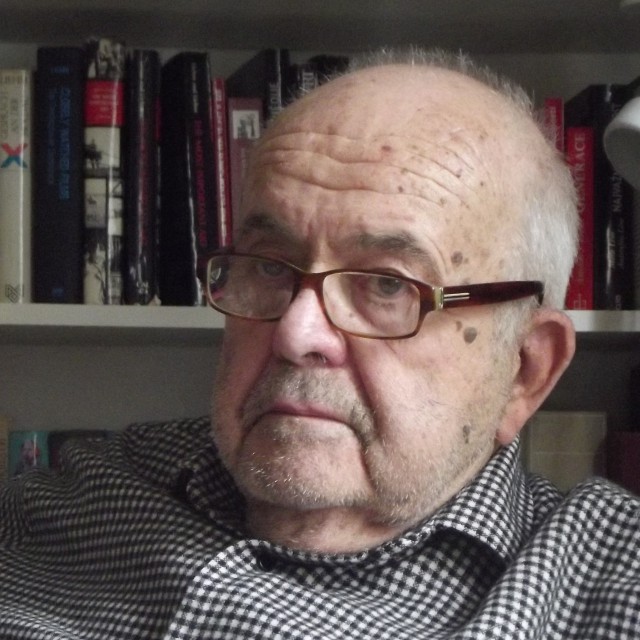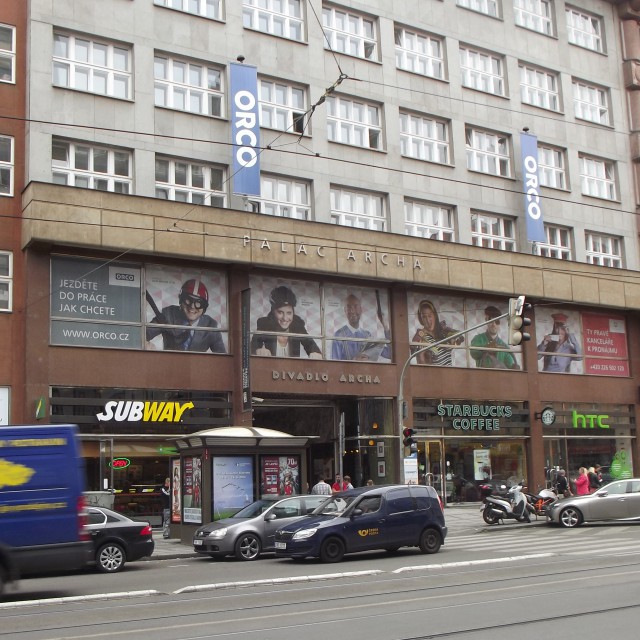The theater which was left
The interwar-period avant-garde theater director Emil František Burian spent the war years 1941-1945 in captivity, at first in Theresienstadt and later in concentration camps. By a miracle he survived the sinking of the Cap Arcona in the waters of the Baltic Sea. He returned to Prague in the second half of May 1945, due to a personal rescue mission of one of his young supporters Antonín J. Liehm. Liehm brought Burian back to Prague and despite the horrors he had experienced in the concentration camps and his poor physical condition, Burian immediately started to work again. This was a time when the Prague theaters were being reallocated and Burian hoped to get back his original D34 Theater in the Mozarteum. However, the Mozarteum had already been taken. The only unoccupied theater that was left was located at the Na Poříčí Street 26, where the Legiobanka had already provided a space for theater in 1938. And now, in times of freedom, Burian had to set up his theater here again: "He came back to Prague three weeks after the end of the war. He went to Poříčí and named the theater 'the theater that was left,'" says his former colleague Antonín J. Liehm. Later, Burian gave it the name D46 according to the year of the season. His first play after his return was Romeo and Juliet, subtitled "The Dream of a Prisoner." Although the play was based on Shakespeare's original drama, it drew heavily from Burian's experiences with the concentration camps. His first postwar voiceband used the verses of František Hrubín. "Hrubín lived in Žižkov and I'd come to his place every day for a few new pages that I'd take to the theater. And Burian rehearsed it straight away," says A. J. Liehm. The voice band was called "Job's Night" (Jobova noc).
Hodnocení
Abyste mohli hodnotit musíte se přihlásit!
Trasy
Příběh není součastí žádné trasy.
Komentáře

Antonín J. Liehm
Antonín J. Liehm was born on March 2, 1924, in Prague. He grew up in Žižkov, his father was a lawyer. Before the war, he got to know Emil František Burian and got involved in the non-theatrical activities around Burian's theater. After his graduation in 1944, he had to do forced labor in agriculture in eastern Bohemia. At the end of the war he returned to Prague. In the days of the Prague uprising, he worked as an interpreter for the International Red Cross. In mid-May 1945, he organized a rescue mission that brought back to Prague the destitute Burian, who had survived the concentration camps and was miraculously saved from a sunken ship in the Baltic Sea. After returning to Prague, E. F. Burian founded the journal "Cultural Policy" and was in charge of it together with A. J. Liehm. Liehm enrolled to study at the University of Political and Social Studies, but did not complete his studies because of his work for the journal. He also shortly worked in the press department of the Foreign Ministry. In 1949, the publication of the magazine was terminated by the authorities and soon Liehm was dismissed from the ministry. In 1950, he began his two years of military service. After returning from military service, he worked in the foreign editorial office of the ČTK until his rehabilitation in 1956, which allowed him to return to his former employment at the ministry. In 1960, he became the editor of the Literary newspaper and significantly contributed to their transformation from an ideological mouthpiece of the party into the most widely read magazine and a symbol of the liberal atmosphere of the Prague Spring. After the August occupation of Czechoslovakia, he decided to leave the country and find work abroad. He applied for asylum in France, lectured at many European and American universities. Since 1970, he lived in the USA. He cooperated with the Rome-based Letters of Jiří Pelikán on a regular basis. In the first half of the 1980s, he returned to France and founded his own international political and cultural magazine "Lettre Internationale," which gradually began to appear in nine languages and since 1989 also in Czech. His participation in the renewed Literary Newspaper in 1990 was refused by the publisher. A. J. Liehm published a number of interviews with leading European and Czech personalities of cultural life, especially the "Interview" (1966), "Generation" (1969/1988), "Closely Watched Films" (1974). In 2002, he published his memoirs "Past in the Present." At the occasion of his 90th birthday, he published the complete collection of his articles in the Letters entitled "The Opinions of the so-called Dalimil," (Názory tak řečeného Dalimila).



